Text
I wonder how many mind games Andrew played with Bee before he started to trust her enough to open up.
#i also wonder how long it took him to open up#like he was going to her from the like day one of his college experience#makes me wonder if he tested her a bit like he tested neil#but not to the extremes he went with neil#idk#andrew minyard#aftg#all for the game#bee aftg
92 notes
·
View notes
Note
Do you ever just think about how the headboard on Kevin's bed on the Nest doesn't budge. Of all the hints about what his life there was like that's the one that gets to me the most because it's so deliberate. Because even though he's probably physically stronger than Riko or at least evenly matched, Kevin wouldn't fight back. But he wasn't given the choice to anyway
honestly i think putting neil in kevin’s side of the room is such a telling choice during the castle evermore scenes. we spend so much of the first and second book hearing about how much kevin fears his so-called family, their haunting of the narrative as bloodthirsty hounds who can sniff out his fear, and when we actually get to finding out why that is we see it from someone who was immediately shoved into kevin’s old place. riko wasn’t just hurting neil because he wanted to (“i’m going to enjoy hurting you just as much as i enjoyed hurting kevin”), he was making sure neil knew he was inferior by putting him in direct contact with the roles kevin and jean played in the nest, using him as a substitute for the one that got away. neil gets a speedrun of some of the worst moments of kevin’s life, and he gets not a single breathing moment for it before he has to be shoved back into exy, like kevin was
i wouldn’t dare presume nora sakavic’s intentions on anything at this point, but i like the idea that neil’s stay at evermore was supposed to tell us all we needed to know about kevin’s time there, without kevin ever having to actually recount the years (he wouldn’t, even if he could): that it was horrifying, and that being in his shoes will never be as glamorous as neil previously thought. i like the breaking of neil’s expectations for kevin; i like how it makes neil realize the life kevin led was not better. and that’s the point, isn’t it? when neil is lying in kevin’s bed, handcuffed to kevin’s headboard, his legs pinned under kevin’s only friend, getting hurt by kevin’s brother, that’s what neil realizes: this is not better. it might be different than life on the run, but it is not better.
#<- wished so badly for a nest era book and got a happy go lucky sequel instead#but whatever its fine.#IT JUST it gets to me how much neil idealized kevin and kevins life#and how the book slowly strips back that jealousy so neil realizes kevin was never free#kevins experiences at evermore are the kind of thing you actually need to live through to fully understand#i sincerely believe that after the dust has settled neil would have an extremely hard time with his memories of evermore#and he would specifically have a hard time looking at kevin and not remembering being in his shoes#it is very intimate what neil went through as kevin’s substitute. it’s also very horrifying#what’s more intimate than experiencing someones horrors like youre them?#anyway i think much of this clearly. and how much riko wanted to have kevin again as well#but thats for another ask i believe#asks#neil#kevin#riko
245 notes
·
View notes
Text
whenever i can't hold myself back and infodump to my rl friends, they tease me for fixating on a fictional guy despite being gay, so it's actually so gratifying to see so many other lesbians also going 'oh but astarion though'
#that clip from neil newbon's stream came across my fyp where one lesbian is writing in about this#and he goes 'oh yeah one of my lesbian friends said the same thing lmao'#what is it about this pixel man. i am going insane#she speaks#arctic plays bg3#it's also fun to browse the subreddit which is extremely male dominated and see tons of straight guys being like#'i went for one of the guys i don't know what this says about me'#game that makes you bisexual whether you like it or not
0 notes
Text
In 1985, one of the only persons interested in an interview with a “new” writer called Terry Pratchett, after his publication of the Colour of Magic, was one Neil Gaiman. Neil Gaiman was writing for Space Voyager at the time. "The Colour of Pratchett" was the name given here:
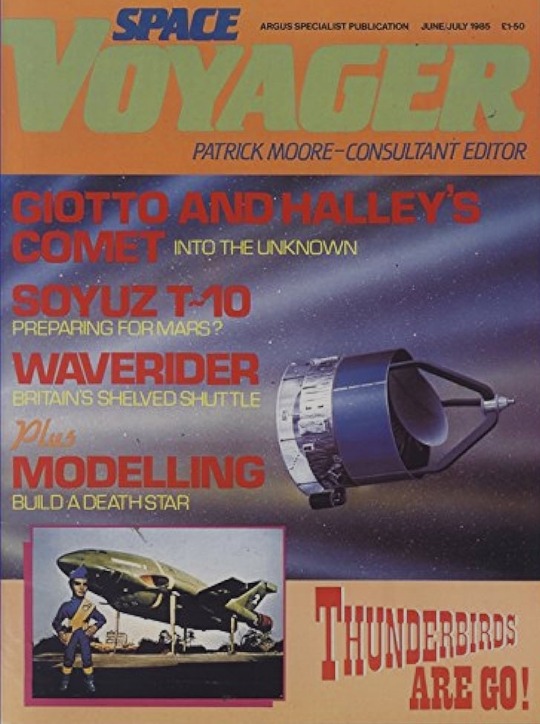
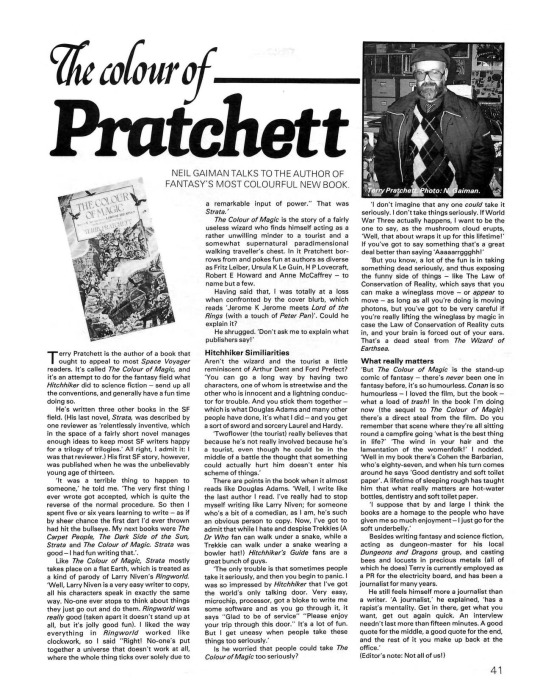
It ran exactly one page inside the June/July issue of that year. The interview took place in a Chinese restaurant in London.
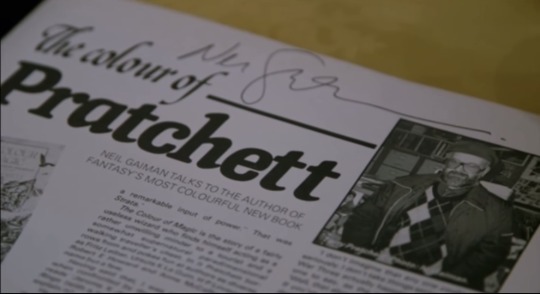
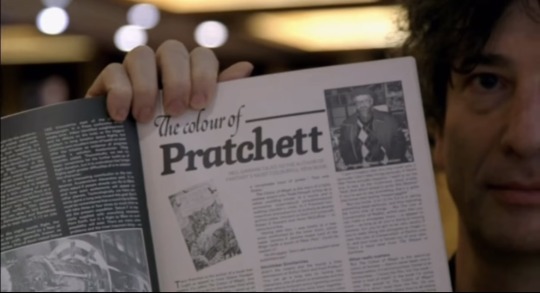
Here is Neil many years later holding that issue. You can see it here if you want. Warning: extremely emotional video.
Neil arrived wearing a grey homburg hat. “Sort of like the ones Humphrey Bogart wears in movies” he later wrote. (Before saying that in fact he did not look like him, but like someone wearing a grown-up’s hat). Terry Pratchett, photo courtesy of one @neil-gaiman, was in a Lenin-style leather cap and a harlequin-patterned pullover. At this point, Terry was already a hat person, although not that hat.
Terry offered Neil this : "An interview needn't last more than 15 minutes. A good quote for the beginning, a good quote for the end, and the rest you make up back at the office"*. (Terry Pratchett had worked many years in journalism by this point ).
But the meeting went terribly well. The two of them realized they had "the same sort of brains". So well indeed, that in 1985, Neil had shown Terry a file containing 5282 words, exploring a scenario in which Richmal Crompton's William Brown had somehow become the Antichrist. Was a collaboration in the cards as of that moment? Not really. But Terry found in Neil someone to whom he could send disks of work in progress and to whom he could pick up the phone sometimes when he hit a brick in the road of his writing.
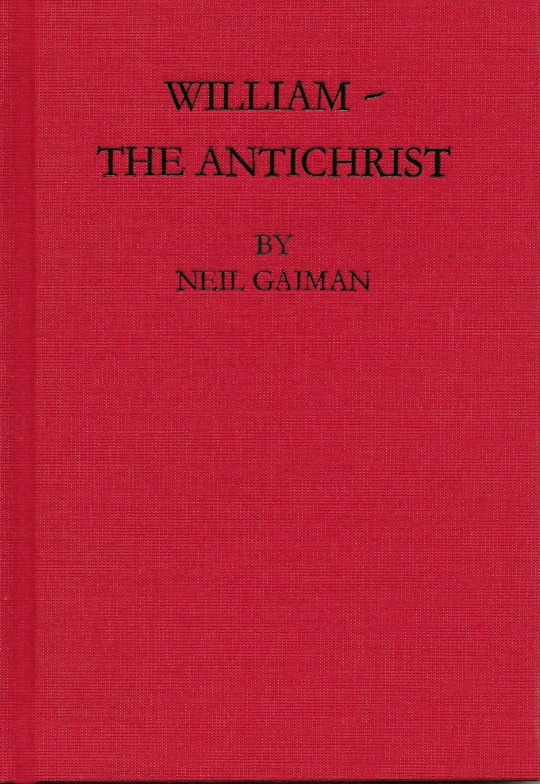
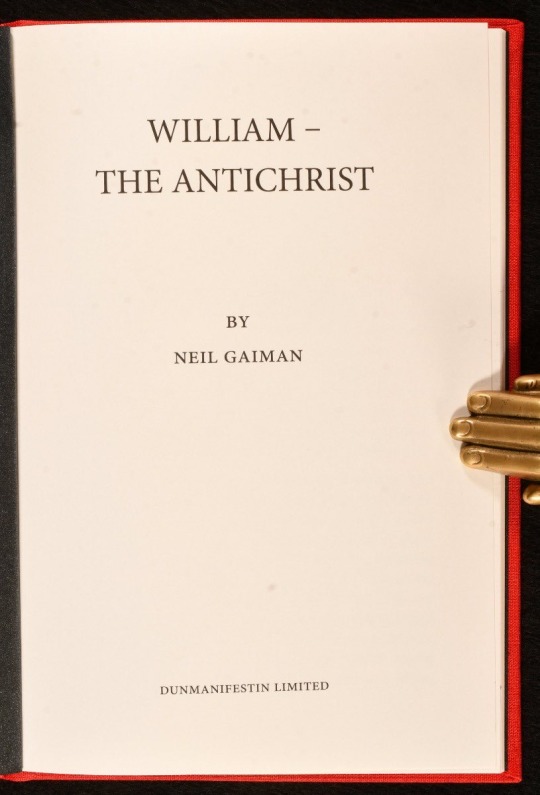
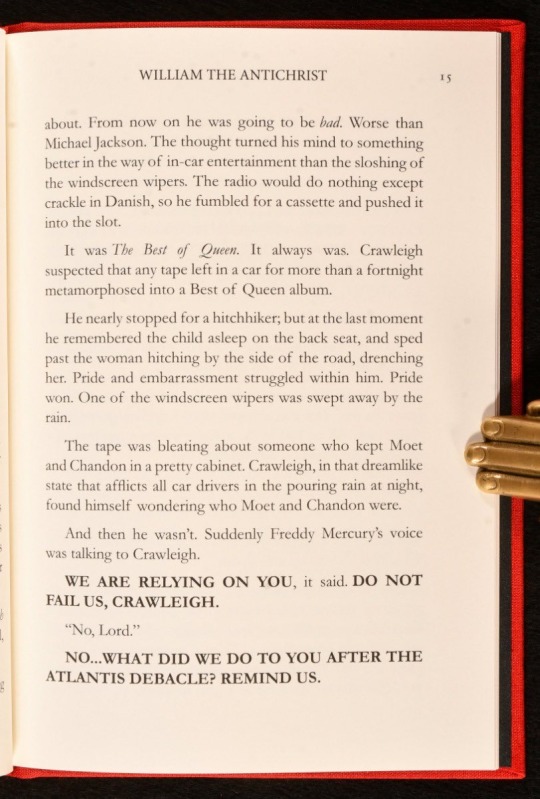
Terry loved it and the concept stayed in his mind. A couple of years later, he rang Neil to ask him if he had done any more work on it. Neil had been busy with The Sandman, he had not really given it another thought. Terry said, "Well I know what happens next, so either you sell me the idea or we can write it together". **
On collaborating together:
Here is a video of Sir Terry saying why he chose to collaborate with Neil, another video talking about the technical difficulties of writing a book when the two of them where miles apart ,and some pages from Interzone Magazine Issue 207 published December 2006:
An Interview with Sir Terry Pratchett and his works- and Neil Gaiman, where he shortly addresses the process of writing Good Omens.
Terry shortly mentions,
“Neil doesn't rule out another book with me and he was good to write with...yep, it could happen. With anyone else? I don't know, but probably not.?”
Neil says,
"Terry took that initial 5,000 words of mine and ran it through the computer (because I’d lost the files in a computer crash) and made it the first 10,000 words, and it was definitely Good Omens at that point. Neither one thing nor the other, but a third thing.”
"I think Terry could do a very good impersonation of me if he needed to, and I could do a very good impersonation of him; so we knew the area of the Venn diagram in which we were working. But mostly the book found its own voice very quickly. It helped that we were both scarred by the William books when we were kids...”


And as you know, unless you’ve been living in Alpha Centauri, the rest is history. That was the beginning of what would become William the Antichrist and later would get the name Good Omens:The Nice and Accurate Prophecies of Agnes Nutter, Witch. (Title provided by Neil Gaiman and subtitle by Terry Pratchett).
More about the writing process:

Terry took the first 5,000 words and typed them into his word processor, and by the time he had finished they were the first 10,000 words. Terry had borrowed all the things about me that he thought were amusing, like my tendency back then to wear sunglasses even when it wasn't sunny, and given them, along with a vintage Bentley, to Crawleigh, who had now become Crowley. The Satanic Nurses were Satanic Nuns.
The book was under way.
We wrote the first draft in about nine weeks. Nine weeks of gloriously long phone calls, in which we would read each other what we'd written, and try to make the other one laugh. We'd plot, delightedly, and then hurry off the phone, determined to get to the next good bit before the other one could. We'd rewrite each other, footnote each other's pages, sometimes even footnote each other's footnotes. We would throw characters in, hand them off when we got stuck. We finished the book and decided we would only tell people a little about the writing process - we would tell them that Agnes Nutter was Terry's, and the Four Horsemen (and the Other Four Motorcyclists) were mine.
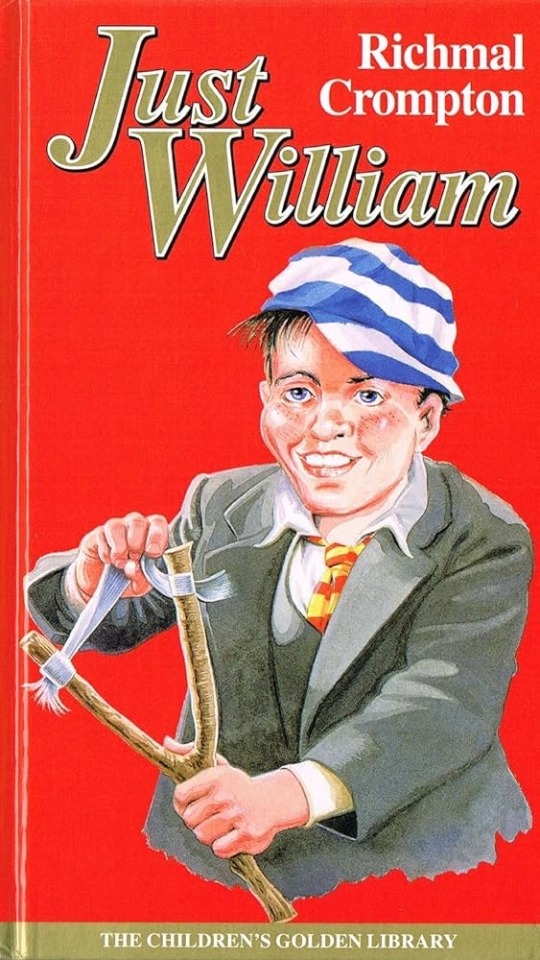
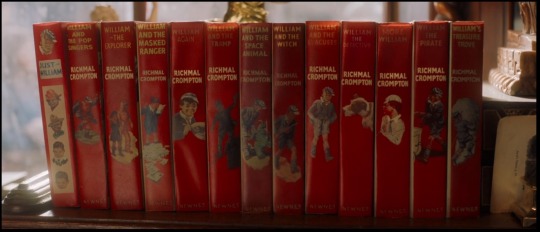
From the introduction to William the Antichrist:
“In the summer of 1987 several odd ideas came together: (..)I found myself imagining a book called William the Antichrist, in which a hapless demon was going to be responsible for swapping the wrong baby over, and the son of the US Ambassador would be completely undemonic, while William Brown would grow up to be the Antichrist, and the demon would need to stop him ending the world. The unfortunate demon, whom I called Crawleigh, because Crawley was a nearby town with an unfortunate name, would have to sort it all out as best he could.
It felt like a story with legs.
Terry took the 5,000 words, and rewrote them, calling me to tell me what he was doing and what he was planning to do. The biggest thing he was going to do, he told me, was split the hapless demon into two characters – a would-be-cool demon in dark glasses (which was, I think, Terry’s way of making fun of me, a never-actually- cool journalist in dark glasses) who had renamed himself Crowley, and a rare-book dealer and angel called Aziraphale, who would embody all the English awkwardness that either of us could conceive.”
William the Antichrist being a direct inspiration of the 1976 film The Omen. If the baby swap had just been a little bit messier and the kid had gone off somewhere else he would have grown up as somebody else. “And then there was a beat and I thought, I should write it, it will be called William the Antichrist” says Neil. ***
“The first draft of Good Omens was a William-book. It was absolutely in every way it could be a William book. It had Violet Elizabeth Bott, it had William and the Outlaws, it had Mr. Brown”.
Over time they realized that they would have more creative freedom if they in their own words filed off the serial numbers. William and the Outlaws becoming Adam and the Them.
But the spirit of Just William was never far away.
The joy for Neil was to construct “perfectly William sentences”. The one when Anathema tells Adam that she has lost the Book, and he tells her that he has written a book about a pirate who became a famous detective and it is 8 pages long… that’s “a William sentence”.
If you want to read more details about William The Antichrist, here are some slides I made.


Good Omens was also inspired by a particularly antisemitic moment in The Jew of Malta and John le Carre's spy novels. (Neil’s ask)
Then I was reading The Jew of Malta by Kit Marlowe, and it has a bit where the three (cartoonishly evil) Jews compare notes on all the well-poisoning and suchlike they’d done that day, and as a Jew who never quite gets his act together, it occurred to me that if I were the third Jew I’d just be apologizing for having failed to poison a well… And suddenly I had the opening of a book. It would be called William the Antichrist. And it would begin with three Demons in a graveyard… (x).
“When we finished the book we estimated that the words were 60% Terry’s and 40% mine, and the plot, such as it was, was entirely ours.” -Neil Gaiman
"Neil and I had known each other since early 1985. Doing it was our idea, not a publisher's deal." "I think this is an honest account of the process of writing Good Omens. It was fairly easy to keep track of because of the way we sent discs to one another, and because I was Keeper of the Official Master Copy I can say that I wrote a bit over two thirds of Good Omens. However, we were on the phone to each other every day, at least once. If you have an idea during a brainstorming session with another guy, whose idea is it? One guy goes and writes 2,000 words after thirty minutes on the phone, what exactly is the process that's happening? I did most of the physical writing because: 1) I had to. Neil had to keep Sandman going -- I could take time off from the DW; 2) One person has to be overall editor, and do all the stitching and filling and slicing and, as I've said before, it was me by agreement -- if it had been a graphic novel, it would have been Neil taking the chair for exactly the same reasons it was me for a novel; 3) I'm a selfish bastard and tried to write ahead to get to the good bits before Neil. Initially, I did most of Adam and the Them and Neil did most of the Four Horsemen, and everything else kind of got done by whoever -- by the end, large sections were being done by a composite creature called Terryandneil, whoever was actually hitting the keys. By agreement, I am allowed to say that Agnes Nutter, her life and death, was completely and utterly mine. And Neil proudly claims responsibility for the maggots. Neil's had a major influence on the opening scenes, me on the ending. In the end, it was this book done by two guys, who shared the money equally and did it for fun and wouldn't do it again for a big clock." "Yes, the maggot reversal was by me, with a gun to Neil's head (although he understood the reasons, it's just that he likes maggots). There couldn't be blood on Adam's hands, even blood spilled by third parties. No-one should die because he was alive." -("Terry Pratchett : His World”)
(Here are some slides of mine where I go into some other details concerning the origins of Good Omens).
Another wonderful insight with Rob Wilkins in "The Worlds of Terry Pratchett".
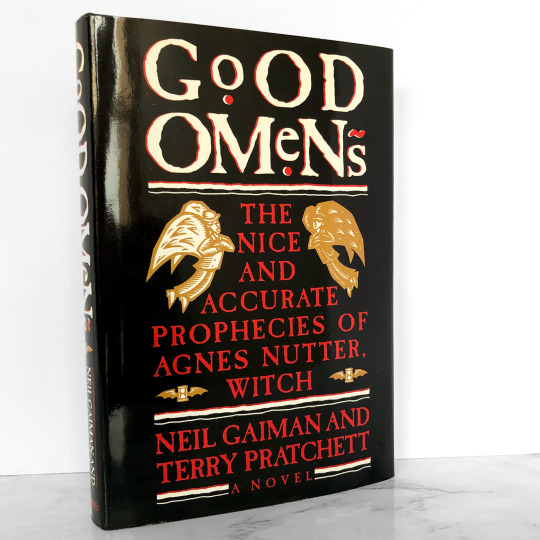
*Quote: from Terry Pratchett A Life With Footnotes by Rob Wilkins, but said by Terry of course.
** All the quotes, facts listed here : see above.
***all other quotes by Neil Gaiman from various interviews and asks I’ll link.
#good omens#neil gaiman#terry pratchett#crowley#aziraphale#ineffable husbands#good omens fun facts#the colour of magic#the colour of pratchett#space voyager magazine
4K notes
·
View notes
Note
Hi Neil.
I know you are flooded with asks and this somehow became extremely long. Too long. “Why am I suddenly telling this poor man my life story?” too long. “I think I’d rather he work on the GO3 script than read this wild beast” too long. “He’s going to think you’re criminally dangerously insane” too long. If you never get to it, I’m good with never seeing a response from you. Maybe it’s better that way? Maybe an anon would have been nice here. But, it’s 2024, so I say “we ball.” It’s a privilege to be able to send this to you at all. You get a lot to this effect and I hope they give you good feels, so maybe what’s the harm, yeah? Because this is not an ask. This is a thank you letter.
First, thanks for reblogging my therapist post, I hope it amused you. I nearly sent you “How am i supposed to explain this to my therapist?!” But refrained. At that time.
So, therapy. What is therapy really? Well…
Things have been really rotten for as long as I can remember. Bad health, bad doctors, bad relationships, bad coping mechanisms, bad all kinds of things. (Yeah, bad is a weak and unhelpful word, my therapist reminds me, but we’re doing this.)
Well, things got even more really really rotten and BAD these last few years. Health declined further, coping mechanisms declined further and more intensely, packed up my life, applied for disability, moved back in with my parents across the country.
Then 4 years ago last week I watched my fiance die of a sudden heart attack. I was 29. Two years later my best friend died. Then last summer I sauntered vaguely into a cancer scare. Not long before an operation my cat who has been my companion through so much garbage died as well. I’m not entirely in the clear on the cancer scare front. All my attempts at going back to work, volunteering, going to grad school - they collapsed on me because I couldn’t get through this STUFF.
(Sometimes when I talk about this, when I tell people, I think “they are going to think you are a raging pathological liar.” Because I’m not sure I would believe someone if they told me all of this happened to them. In such a short time period. All before they were 35. And hell if that hasn’t been isolating. You know how it sounds? Lonely. And it is.)
I did the hypervigilant and sensation/experience chasing stage of PTSD. It got me in a lot of trouble in all kinds of ways. I had to do a lot of medical and psych advocating because things kept getting worse. That was exhausting. Then that peaked. I went into the thick of the “I feel absolutely nothing” stage for a long time. I didn’t feel fatigue or hunger or thirst. Not people, feelings, a reason. Not hope.
But of course, like seems be for a lot of us, I somehow found Good Omens at just the right time. I was a very “I’m so cool and intellectual I mostly consume non-fiction media” person for too long. Like, what? How is that even a real thing? And it wasn’t real. It was just part of this curated autism mask that I don’t think anyone really bought anyway.
I think I got to a point where I’d just had too much reality. I needed fantasy. I didn’t realize I always needed it. But I denied myself for too many odd and painful reasons. Maybe I thought it was an escape I didn’t deserve.
But as it turns out, it wasn’t an escape. I watched both seasons last fall, and then this light came on. I watched it again and again.
I came to tumblr because I needed more. I found this fandom. I stepped into this beautiful world of fanart and fanfiction and brain flexing meta writing and a sense of community and wonder that you and Terry created - that everyone involved in the show inflated - exploded in the right way - like fireworks if fireworks were some kind of autocatalytic reaction - a self perpetuating force.
It’s not a “saved my life” feeling. Not a “getting my life back” feeling. It’s been a “maybe it’s time for you to have the life you’ve always been denied - that you’ve denied yourself” feeling.
I’m creating. I’m not “great” yet. Not terribly “good” at all. Maybe “behind” as far as the “proper” timeline for starting. I know there isn’t one, not really, but boy does that society machine make ya feel like there is. And sure, I started and stopped a lot in the past. But the second it got hard I always gave up. I felt like if I didn’t get it “right” to begin with, then I just didn’t have it in me at all. But for once I’m really in it. I’m writing and trying to draw things that look less like fever dream five year old drawings. (Not that there’s anything wrong with those, is there? 🙃) I’m eating better. I’m sleeping better. I reach out to old friends more. I’ve made new friends who share this love of Good Omens.
My therapist has been floored by the change in me. After that first funny mini flop, he has been so encouraging about it. I saw him this week and I said “Maybe this is helping me get prepared to start living again. Maybe it’s a springboard.” And he honest to god said “But You ARE living. This is YOU LIVING. Why does it have to be a springboard? Why do you have to turn this into ‘work?’ Just let yourself have this for once in your life.”
But there were two more added elements that made it all work. And I can’t help but think this whole brainrot thing wouldn’t have happened without them. So many things just happened all at just the right time - a proper coincidence.
In all of the madness of the last few years I finally got the memo that I'm autistic. i figured I was for a while. But it finally sunk in for me and my docs and my people. So I’d been working on unpacking that. Grieving the life that could have been entirely different, shedding the mask. I let myself hyperfixate openly instead of hiding it and hating myself for “spiralling” or “obsessing” like others -!like ‘I’ always punished myself for before we knew that it was a trait and not a personality flaw.
Then over the last few months my therapist and I started trying this new exercise. One session he stopped me and said “in the last 20 minutes you have responded to what I’ve said with 9 ‘I knows.’” My response to that? “Ugh, I know.” So we started this “I know” swear jar type situation. Really, I’ve been afraid of not knowing. I couldn’t let myself “not know.” Because it meant I was “dumb.” I was just drowning for so long in guilt and self loathing for the “I knew better and screwed up anyway.” Or “I should’ve known better - I should know that by now.”
As it turns out, there’s a lot of things I don’t know. That I didn’t know. Things I will never know. And refusing to admit all of that kept me from learning a damn thing. Kept me from asking questions. Kept me from trying new things because it was scary to do something new - something unknown - and I "knew" how it would all turn out anyway. Kept me from connecting with people because it was painful or embarrassing when they knew things I didn’t and it seemed like I already should have. Kept me from getting better at making art, music, writing. Kept me from forgiving myself. Kept me from growing. And kept me from moving forward. Maybe not on. I don’t know if we ever “move on” from things. But we can move forward as we carry them. And as we do, the weight gets less. We’re able to carry it better. But only if we can admit that we don’t know how. Only if we don’t treat ourselves like this is something we do know or should know and we’re just failing because we’re less than. Not good enough. Not strong enough. Not deserving. We have to be able to say “I don’t know how to do this.” And then we can start looking for the answers. We can ask. We can learn.
I thought about the apple. Being able to tell the difference between good and evil. Aziraphale’s years and years of watching what he “knows” to be true be proven wrong. Crowley’s need to ask questions…
The simple and enormous gift of “Knowledge.” The “Knowledge” of the difference between Good and Evil. The “Knowledge” that can only be gained by realizing, accepting, admitting that there are things we don’t know. Asking the questions. Sometimes we get answers we don’t like. Sometimes the consequences of asking hurt us. And unless you want to stay in that painful place that painful knowledge got you, well, you’ve got to let yourself learn how to get out.
So all of this good? I never expected this. I never thought I deserved it. Joy and belonging and this sense that “Yeah, maybe things can get better. Maybe things can be good.” Because I said those things, not truly believing them, to the people I thought needed to hear it. But it couldn’t save them. It was hollow. The proof for us wasn’t really in our orbit or on our radar at the time. And now they’re gone.
People always say “it’s never too late.”
One of the people I lost said “it’s later than you think.”
I jokingly would respond “it’s already too late.”
It was for him in the end. For them. For some people I guess it really is. But maybe a lot of the “too late” people are there because they think “they know” that things will never be good for them. So they stop looking, they stop asking, stop finding. And eventually they just stop.
Then there came Crowley’s “It’s always too late.” The first time I heard it I thought “For sure, Crowley-cakes, I KNOW.”
But then…I just needed to rewatch the whole thing. And lines like that…familiar things…familiar themes…I was suddenly identifying with these characters. I suddenly saw myself. And the realization hit - I connected with something! Something new. And I FELT THAT. And that tiny little crack that made in the wall was just enough to start breaking it down. Yeah, when you start letting yourself feel after not feeling for so long, opening up to the good feelings means opening up to feelings and then the bad ones come out too. But when there IS good … it helps you balance. You can deal with the bad a little better because you’ve got the good thing to lean against when it gets too much. And now you’ve got feelings. You’ve got good and bad. You’ve got sticky foggy grey. You’ve got life.
Whew.
So, TLDR, thank you. From the bottom of my slowly healing heart, thank you.
And to sign off with some shits and giggles… I couldn’t find this in existence as a sticker so I had to custom order. Perhaps this will spread misery and panic among the humans of my city - or at least a malignant and creepy sense of unease.
Or maybe they’ll say “wtf” and go home and google it and they’ll fall into the Good Omens hole they never knew they needed too.
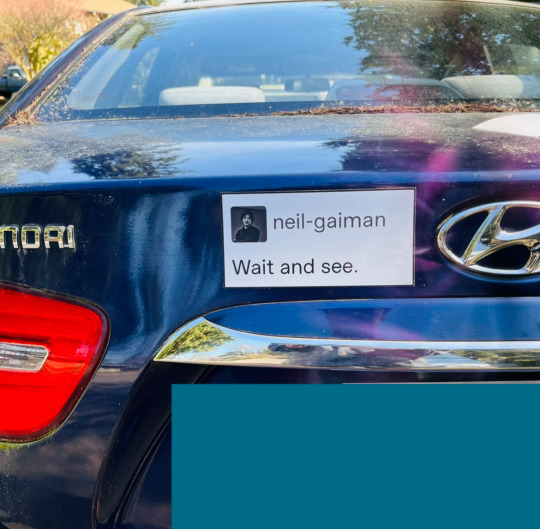
Thank you for this. I never quite know what to say to messages like this apart from I am really glad that it helps. (It becomes the weird extra piece that I worry about when writing season 3 -- hoping that it will be that thing again. Not just a story, but something that helps people feel and helps with healing and helps with love.)
1K notes
·
View notes
Text
Just read screenshots of the Aaron extra chapter and I have so many thoughts, so here they are:
It's always so funny to me to be reminded of the fact that the animosity between Aaron and Neil is mostly one-sided. Like, Neil finds Aaron frustrating, but all the antagonistic stuff he does to him is ultimately in service of helping him in some way and while he's angry when Aaron provokes him, he otherwise regards him with disinterest and even expresses the desire to see what he's like when he's relaxed and enjoying himself during the party with the Vixens. Meanwhile Aaron just really hates that man.
I really appreciated Nora using this chapter to clear up some of the gripes a lot of the fandom has had with Aaron's character in the past and confirm that Aaron's comments to Nicky have to do with his cousin making graphic and unwanted sexual advances on their teammates, and his accusations towards Neil were from a place of concern for his brother. I also liked that it was pointed out that of course he would have at least some internalized homophobia due to being raised by religious zealots in a conservative area, but is unlearning it due to Nicky.
On a similar note, I'm glad that we were provided the context that Nicky's inappropriate behavior is a defense mechanism to weed out people who might hurt him rather than legitimate advances, because I think the fandom tends to forget that he is also a character with extreme trauma written outside of the "perfect victim" stereotype. His actions aren't okay, but the entire point is that they are the result of what he's had to endure just like every other member of the team
The implication that Andrew specifically signed with the Foxes so Aaron could go to college
Aaron and Andrew have the same nervous habit of picking at loose thread
It causes me physical pain to see Andrew clearly trying to open up to Aaron about his self-harm, but because his way of communicating is less straightforward (he doesn't lie, but he because he stuggles to confront and be open with his emotions, he presents the truth in flowery, vague language) and because the two dont really know or understand each other, Aaron can't fully grasp the implications of what he's saying
On the subject of things that cause me physical pain: baby Aaron telling his mom that he wanted to be a neurosurgeon like the people on TV and her laughing and saying he'd never make anything of himself. Fuck Tilda Minyard, all my homies hate Tilda.
Andrew is so uncomfortable, someone Get Him Out of There.
Going off that and his nervous habits (that Aaron mentions he did often enough to be noticable as a habit premedication), I am highkey wondering if the reason Sober Andrew doesn't talk to anyone outside Neil is because he's just. Socially Awkward.
We get a little bit of insight into Andrew's "misogyny" (I personally think distrusting certain people as a result of extreme personal trauma is a little bit different than just being sexist, in the same way women distrusting men because they're used to being harassed and belittled isn't misandry, but that's up to your personal opinion) and that his distain for Katelyn comes from the fact that he thinks she's stringing Aaron along and will turn out to be awful like his previous girlfriends (there's also a notable implication that Aaron has the same self-destructive tendencies as Andrew, and may be why he went out of his way to get him into college and on the straight-and-narrow) also see that this extends to Bee as well despite their close relationship, with him being so afraid that she'd reject him for being gay that he can't even look at her while talking about Neil, probably made worse by the fact that she's a maternal figure for him, which is where this trauma response originates.
Aaron is the only person on the team who's aware that Andrew hasn't slept with Neil, and the only one to grasp the significance of the fact that they've gotten close to that point already despite Andrew's trauma, outside of Renee
It was overall really interesting to see inside Aaron's head (I actually wouldn't mind a book from his perspective, he has a similar way of thinking to Neil but much more grounded) and to see Andrew through the lense of someone who just views him as Just A Guy
#obligatory disclaimer that these are my OPINIONS#im not going to tolerate anyone being rude or hateful#aaron minyard#andrew minyard#aftg#aftg extra chapters#all for the game#all for the game extra chapters
386 notes
·
View notes
Text
Okay, little stream-of-consciousness-moment:
Billy, who's mind is like a steel trap, who isn't a scared little child, but a healthy, angry young adult. And the mindflayer doesn't even know what hit it. One second it's infiltrating grey matter, overtaking neural pathways and becoming one with this new vessel and the next second it's burning alive, it's crumbling and shrinking and screeching in agony as the human body does what is does best to foreign invaders: try to kill it.
I've always loved the posts on tumblr that explore how deeply weird humans would be to aliens. Our physiology, our mentality, when spoken of as animal traits they are all deeply disturbing. We're persistence predators. We're built to last. We can survive unimaginable horrors (and also die from the stupidest, most everyday things). Our main predator, is ourselves. A bite from a child can kill another human just from the bacteria alone if left untreated. Our bodies are designed to kill entities both within and without.
Humans are fucking terrifying.
So the mindflayer is so unprepared for an adult human who's been through too much shit already. Not just a tired little slip of a kid, but a healthy, entering-his-prime human and is eradicated with extreme prejudice by nothing more than a good immune system going into overdrive.
But it's too deeply imbeded, so the body again does what it can to protect itself, it encases it. Within the body, but separate. Calcified. Caged.
So here's Billy, who has a rather spotty memory of a car crash and feels like he has a head cold for a couple of days before he gets on with his life. Only weird shit keeps happening to him, now. Like that time he encounters a pack of dogs while out drinking by the quarry, except they look really fucked-up the closer they get, not like any dog Billy's ever seen before, and just as he's prepared for an attack from these things, they just walk up to him and sniff around a bit with their weird flower heads blooming and closing, but otherwise leaving him unharmed. And Billy's just this side of drunk where terrible ideas seem kinda brilliant and he tells the things to sit. And they do. Amazed, he tosses his beer bottle and tells them go fetch, and again, one does.
And then when it's time to go home Billy offhandedly tells them to get lost and they run off back into the woods, and when he wakes up in the morning it's easy to rationalise it away. Probably the beer had been rolling around in the car for too long and it went bad and fucked him up. Should just have thrown the whole sixpack out. Those were just regular dogs, for sure. Except the next day, when he's out behind the pool building trying to find a good spot to smoke, he steps onto soft soil or something and falls down into a weird ass tunnel and a bunch of those same monster dogs just appear out of nowhere and pile themselves on top of each other for him to be able to climb out. And a couple of days later when Neil smacks Billy around for being out late again, one of those dogs honest to God comes crashing through the living room window to shred Neil's leg up and leaves just as quickly at the first sign of panic from Billy.
And yeah okay, by this stage Billy's figuring out things are kinda fucky around Hawkins, and so it's just Billy having his own little side adventure in the background while the rest of the gang are running around Hawkins trying desperately to find the Mindflayer, not knowing that Billy unknowingly trapped it within himself and is just living his life, teaching these weirdly obedient alien dogs to do tricks because they keep helping him or seeking him out.
Anyway, upside down is doomed because their leader is literally trapped inside Billy and Billy is just teaching these dog-things to steal cigarettes from the gas station and volunteering for the closing shift at the pool because he can just get the dogs to bring the pool noodles back into the shed.
#don't know what this is#but it amuses me to think of season three as the gang running around hawkins and in the background of every scene#you just see Billy and the Demodogs doing their own thing#billy hargrove
403 notes
·
View notes
Text
"I think Aziraphale needs to learn a lot more than that..."
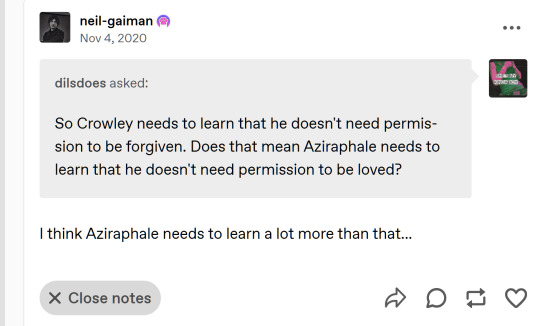
Why do people keep (telling me again and again about this quote) assuming that Neil means Aziraphale needs some moral lessons, get off his high horse, learn some hard truths about Heaven, escape their grasp, finally understand that they are bad etc etc etc.
When the ask is about how Crowley is always forgiven from Aziraphale's point of view and how what (I see) Neil means is that Azi should also be told he's good enough. That he can be loved.
That what he needs to learn is how to believe in himself. To trust his mind, his feelings, to believe he is enough, he always was, that he doesn't have to be perfect or 100% right, that it is not possible and that it's okay. That he's okay. That he was lied to.
I wish we would frame Aziraphale's journey/learning as something else, not morality/awakening of some sort. Not as something he has to overcome. When Crowley changes his mind on something, no one says, oh have a gold star, you went against what Hell wants from you. Well done! Why do we do that to Aziraphale. Crowley is seen in Hell, giving presentations on some half hearted ideas that no one there really gets and getting accolades for things he didn't do at all and everyone is like, oh yay, look at him, so clever. Hahahah. Aziraphale also has to follow rules and do his tasks whether he agrees with them or not or he will be punished. He's not doing it for fun. He breaks rules when he feels he simply must and then everyone is like oh look, he is finally abandoning the rigid thinking that Heaven showed/taught him. But really, the naïve slow angel, he should try even harder.
Why such double standards?
Aziraphale is good and wants to do good. He is not sure of himself, true, but that's hardly his fault. Crowley is also good and tries to do good or at least limit the bad things he needs to do to survive.
They are two sides of the same coin. They both learn and grow. Sometimes the treatment the Ineffables get reminds me of how differently boys and girls are treated when they are learning behaviour. Boys praised for anything and everything even remotely good they do (cos they are expected to be naughty) and girls get the oh you should have already known better treatment. Aziraphale saved Job's kids cos he thought it was a horrible thing to want to do and expected to be punished for it. That's not - he didn't, it didn't change who he is. He did it expecting Falling. That's extremely brave. Yes Crowley has Fallen and people tend to see this as some extra superior move on his behalf, like he had everything figured out, understood how bad Heaven was and tried to bravely fix it. And Aziraphale needs to catch up with him. (If not by Falling himself than by doing some extraordinary learning journey to catch up with Crowley's knowledge). No. That's all HC. We don't even know why Crowley Fell. We don't. We know what he says happened (and we also know that he's not a reliable narrator...) and that's all we know. And even the things he says are not exactly showing him as some truth waving hero only wanting to make Heaven better for everyone and failing. Aziraphale is not breaking rules cos suddenly he used his brain and saw how Heaven is bad. He already knows that. He's risking punishment to help others. Again and again. And that's very kind and admirable and everything but it's not his evolving morality. He's already moral. He's already good. He always was.
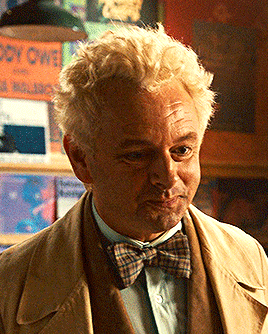
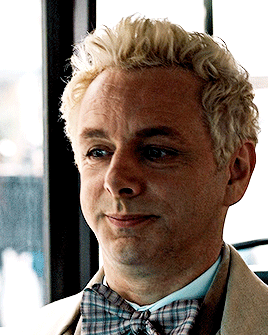
He's also fucking cute. Let's not forget.
#good omens#aziraphale#crowley#ineffable husbands#aziracrow#good omens 2#aziraphale my beloved#good omens thoughts#Aziraphale defence squad#kaypost
429 notes
·
View notes
Text
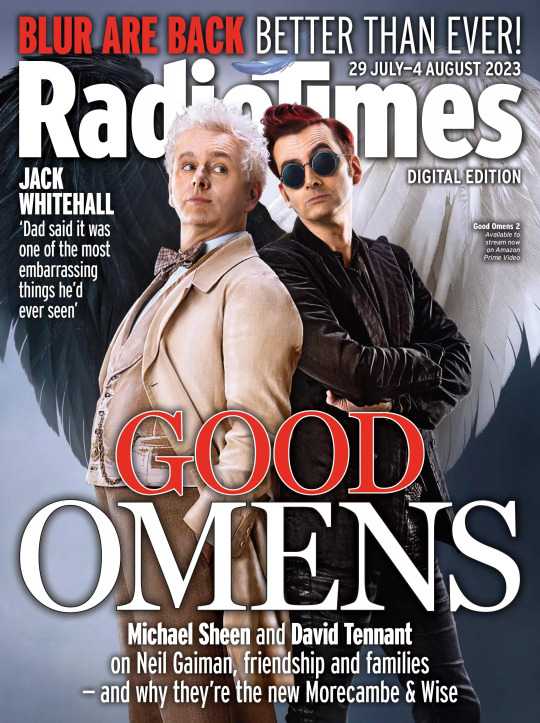
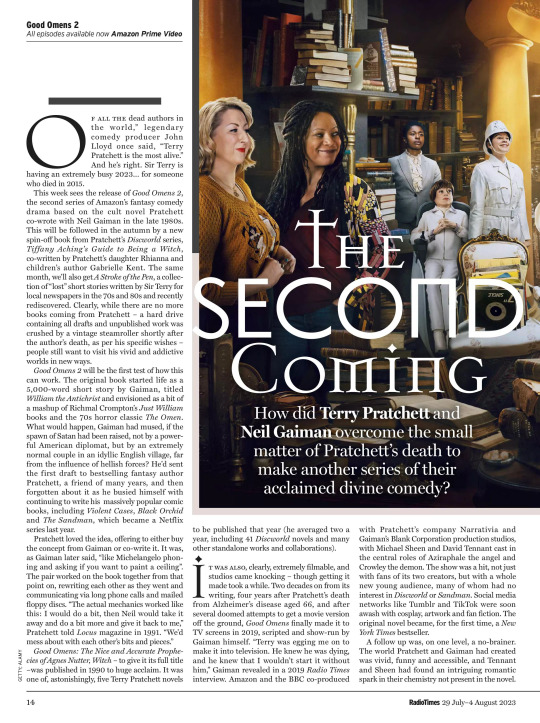
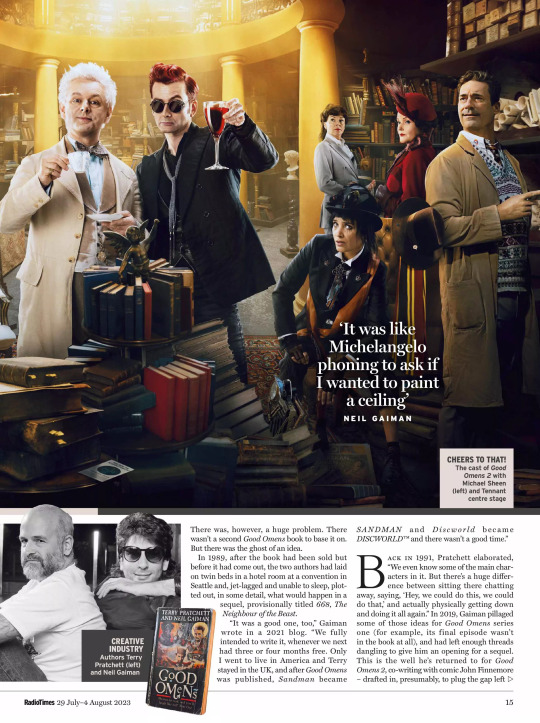
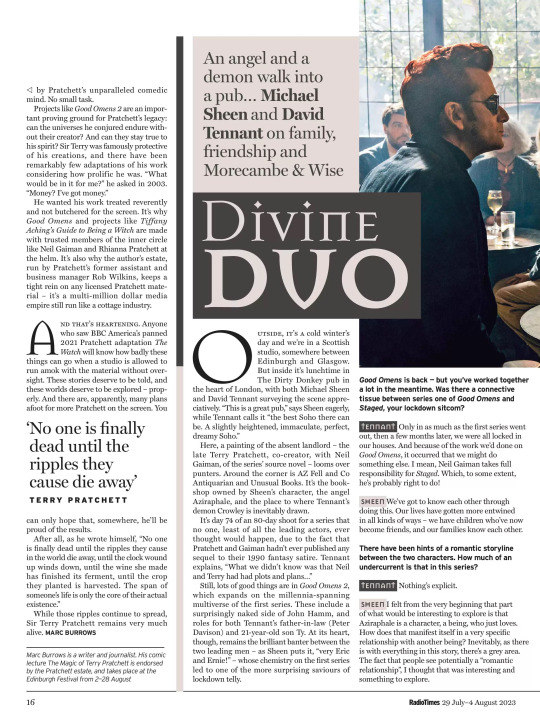
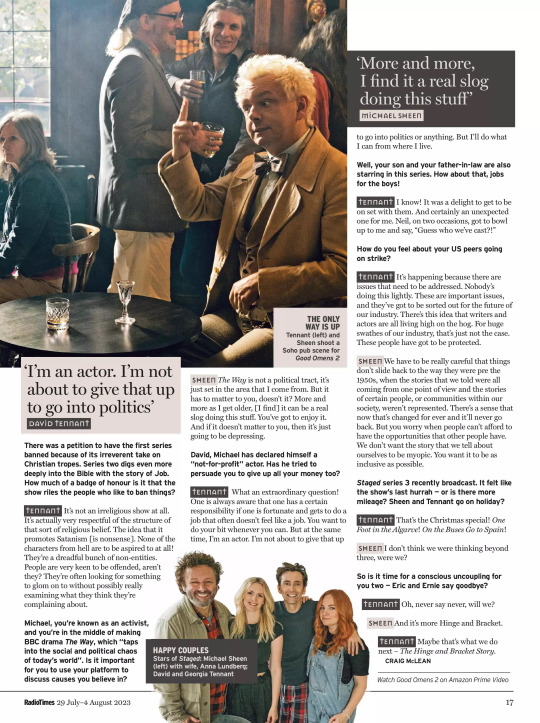
The Radio Times magazine from the 29 July-04 August 2023 :)
THE SECOND COMING
How did Terry Pratchett and Neil gaiman overcome the small matter of Pratchett's death to make another series of their acclaimed divine comedy?
For all the dead authors in the world,” legendary comedy producer John Lloyd once said, “Terry Pratchett is the most alive.” And he’s right. Sir Terry is having an extremely busy 2023… for someone who died in 2015.
This week sees the release of Good Omens 2, the second series of Amazon’s fantasy comedy drama based on the cult novel Pratchett co-wrote with Neil Gaiman in the late 1980s. This will be followed in the autumn by a new spin-off book from Pratchett’s Discworld series, Tiffany Aching’s Guide to Being a Witch, co-written by Pratchett’s daughter Rhianna and children’s author Gabrielle Kent. The same month, we’ll also get A Stroke of the Pen, a collection of “lost” short stories written by Sir Terry for local newspapers in the 70s and 80s and recently rediscovered. Clearly, while there are no more books coming from Pratchett – a hard drive containing all drafts and unpublished work was crushed by a vintage steamroller shortly after the author’s death, as per his specific wishes – people still want to visit his vivid and addictive worlds in new ways.
Good Omens 2 will be the first test of how this can work. The original book started life as a 5,000-word short story by Gaiman, titled William the Antichrist and envisioned as a bit of a mashup of Richmal Crompton’s Just William books and the 70s horror classic The Omen. What would happen, Gaiman had mused, if the spawn of Satan had been raised, not by a powerful American diplomat, but by an extremely normal couple in an idyllic English village, far from the influence of hellish forces? He’d sent the first draft to bestselling fantasy author Pratchett, a friend of many years, and then forgotten about it as he busied himself with continuing to write his massively popular comic books, including Violent Cases, Black Orchid and The Sandman, which became a Netflix series last year.
Pratchett loved the idea, offering to either buy the concept from Gaiman or co-write it. It was, as Gaiman later said, “like Michelangelo phoning and asking if you want to paint a ceiling” The pair worked on the book together from that point on, rewriting each other as they went and communicating via long phone calls and mailed floppy discs. “The actual mechanics worked like this: I would do a bit, then Neil would take it away and do a bit more and give it back to me,” Pratchett told Locus magazine in 1991. “We’d mess about with each other’s bits and pieces.”
Good Omens: The Nice and Accurate Prophecies of Agnes Nutter, Witch – to give it its full title –was published in 1990 to huge acclaim. It was one of, astonishingly, five Terry Pratchett novels to be published that year (he averaged two a year, including 41 Discworld novels and many other standalone works and collaborations).
It was also, clearly, extremely filmable, and studios came knocking — though getting it made took a while. rnvo decades on from its writing, four years after Pratchett's death from Alzheimer's disease aged 66, and after several doomed attempts to get a movie version off the ground, Good Omens finally made it to TV screens in 2019, scripted and show-run by Gaiman himself. "Terry was egging me on to make it into television. He knew he was dying, and he knew that I wouldn't start it without him," Gaiman revealed in a 2019 Radio Times interview. Amazon and the BBC co-produced with Pratchett's company Narrativia and Gaiman's Blank Corporation production studios, with Michael Sheen and David Tennant cast in the central roles of Aziraphale the angel and Crowley the demon. The show was a hit, not just with fans of its two creators, but with a whole new young audience, many of whom had no interest in Discworld or Sandman. Social media networks like Tumblr and TikTok were soon awash with cosplay, artwork and fan fiction. The original novel became, for the first time, a New York Times bestseller.
A follow up was, on one level, a no-brainer. The world Pratchett and Gaiman had created was vivid, funny and accessible, and Tennant and Sheen had found an intriguing romantic spark in their chemistry not present in the novel.
There was, however, a huge problem. There wasn't a second Good Omens book to base it on. But there was the ghost of an idea.
In 1989, after the book had been sold but before it had come out, the two authors had laid on fivin beds in a hotel room at a convention in Seattle and, jet-lagged and unable to sleep, plotted out, in some detail, what would happen in a sequel, provisionally titled 668, The II Neighbour of the Beast.
"It was a good one, too" Gaiman wrote in a 2021 blog. "We fully intended to write it, whenever we next had three or four months free. Only I went to live in America and Terry stayed in the UK, and after Good Omens was published, Sandman became SANDMAN and Discworld became DISCWORLD(TM) and there wasn't a good time."
Back in 1991, Pratchett elaborated, "We even know some of the main characters in it. But there's a huge difference between sitting there chatting away, saying, 'Hey, we could do this, we could do that,' and actually physically getting down and doing it all again." In 2019, Gaiman pillaged some of those ideas for Good Omens series one (for example, its final episode wasn't in the book at all), and had left enough threads dangling to give him an opening for a sequel. This is the well he's returned to for Good Omens 2, co-writing with comic John Finnemore - drafted in, presumably, to plug the gap left Pratchett's unparalleled comedic mind. No small task.
Projects like Good Omens 2 are an important proving ground for Pratchett's legacy: can the universes he conjured endure without their creator? And can they stay true to his spirit? Sir Terry was famously protective of his creations, and there have been remarkably few adaptations of his work considering how prolific he was. "What would be in it for me?" he asked in 2003. "Money? I've got money."
He wanted his work treated reverently and not butchered for the screen. It's why Good Omens and projects like Tiffany Aching's Guide to Being a Witch are made with trusted members of the inner circle like Neil Gaiman and Rhianna Pratchett at the helm. It's also why the author's estate, run by Pratchett's former assistant and business manager Rob Wilkins, keeps a tight rein on any licensed Pratchett material — it's a multi-million dollar media empire still run like a cottage industry.
And that's heartening. Anyone who saw BBC America's panned 2021 Pratchett adaptation The Watch will know how badly these things can go when a studio is allowed to run amok with the material without oversight. These stories deserve to be told, and these worlds deserve to be explored — properly. And there are, apparently, many plans afoot for more Pratchett on the screen. You can only hope that, somewhere, he'll be proud of the results.
After all, as he wrote himself, "No one is finally dead until the ripples they cause in the world die away, until the clock wound up winds down, until the wine she made has finished its ferment, until the crop they planted is harvested. The span of someone's life is only the core of their actual existence."
While those ripples continue to spread, Sir Terry Pratchett remains very much alive. MARC BURROWS
DIVINE DUO
An angel and a demon walk into a pub... Michael Sheen and David Tennant on family, friendship and Morecambe & Wise
Outside it's cold winter's day and we're in a Scottish studio, somewhere between Edinburgh and Glasgow. But inside it's lunchtime in The Dirty Donkey pub in the heart of London, with both Michael Sheen and David Tennant surveying the scene appreciatively. "This is a great pub," says Sheen eagerly, while Tennant calls it "the best Soho there can be. A slightly heightened, immaculate, perfect, dreamy Soho."
Here, a painting of the absent landlord — the late Terry Pratchett, co-creator, with Neil Gaiman, of the series' source novel — looms over punters. Around the corner is AZ Fell and Co Antiquarian and Unusual Books. It's the bookshop owned by Sheen's character, the angel Aziraphale, and the place to where Tennant's demon Crowley is inevitably drawn.
It's day 74 of an 80-day shoot for a series that no one, least of all the leading actors, ever thought would happen, due to the fact that Pratchett and Gaiman hadn't ever published any sequel to their 1990 fantasy satire. Tennant explains, "What we didn't know was that Neil and Terry had had plots and plans..."
Still, lots of good things are in Good Omens 2, which expands on the millennia-spanning multiverse of the first series. These include a surprisingly naked side of John Hamm, and roles for both Tennant's father-in-law (Peter Davison) and 21-year-old son Ty. At its heart, though, remains the brilliant banter between the two leading men — as Sheen puts it, "very Eric and Ernie !" — whose chemistry on the first series led to one of the more surprising saviours of lockdown telly.
Good Omens is back — but you've worked together a lot in the meantime. Was there a connective tissue between series one of Good Omens and Staged, your lockdown sitcom?
David: Only in as much as the first series went out, then a few months later, we were all locked in our houses. And because of the work we'd done on Good Omens, it occurred that we might do something else. I mean, Neil Gaiman takes full responsibility for Staged. Which, to some extent, he's probably right to do!
Michael: We've got to know each other through doing this. Our lives have gotten more entwined in all kinds of ways — we have children who've now become friends, and our families know each other.
There have been hints of a romantic storyline between the two characters. How much of an undercurrent is that in this series.
David: Nothing's explicit.
Michael: I felt from the very beginning that part of what would be interesting to explore is that Aziraphale is a character, a being, who just loves. How does that manifest itself in a very specific relationship with another being? Inevitably, as there is with everything in this story, there's a grey area. The fact that people see potentially a "romantic relationship", I thought that was interesting and something to explore.
There was a petition to have the first series banned because of its irreverent take on Christian tropes. Series two digs even more deeply into the Bible with the story of Job. How much of a badge of honour is it that the show riles the people who like to ban things?
David: It's not an irreligious show at all. It's actually very respectful of the structure of that sort of religious belief. The idea that it promotes Satanism [is nonsense]. None of the characters from hell are to be aspired to at all! They're a dreadful bunch of non-entities. People are very keen to be offended, aren't they? They're often looking for something to glom on to without possibly really examining what they think they're complaining about.
Michael, you're known as an activist, and you're in the middle of Making BBC drama The Way, which "taps into the social and political chaos of today's world". Is it important for you to use your plaform to discuss causes you believe in?
Michael: The Way is not a political tract, it's just set in the area that I come from. But it has to matter to you, doesn't it? More and more as I get older, [I find] it can be a real slog doing this stuff. You've got to enjoy it. And if it doesn't matter to you, then it's just going to be depressing.
David, Michael has declared himself a "not-for-profit" actor. Has he tried to persuade you to give up all your money too?
David: What an extraordinary question! One is always aware that one has a certain responsibility if one is fortunate and gets to do a job that often doesn't feel like a job. You want to do your bit whenever you can. But at the same time, I'm an actor. I'm not about to give that up to go into politics or anything. But I'll do what I can from where I live.
Well, your son and your father-in-law are also starring in this series. How about that, jobs for the boys!
David: I know! It was a delight to get to be on set with them. And certainly an unexpected one for me. Neil, on two occasions, got to bowl up to me and say, "Guess who we've cast?!"
How do you feel about your US peers going on strike?
David: It's happening because there are issues that need to be addressed. Nobody's doing this lightly. These are important issues, and they've got to be sorted out for the future of our industry. There's this idea that writers and actors are all living high on the hog. For huge swathes of our industry, that's just not the case. These people have got to be protected.
Michael: We have to be really careful that things don't slide back to the way they were pre the 1950s, when the stories that we told were all coming from one point of view and the stories of certain people, or communities within our society, weren't represented. There's a sense that now that's changed for ever and it'll never go back. But you worry when people can't afford to have the opportunities that other people have. We don't want the story that we tell about ourselves to be myopic. You want it to be as inclusive as possible
Staged series 3 recently broadcast. It felt like the show's last hurrah — or is there more mileage? Sheen and Tennant go on holiday?
David: That's the Christmas special! One Foot in the Algarve! On the Buses Go to Spain!
Michael: I don't think we were thinking beyond three, were we?
So is it time for a conscious uncoupling for you two — Eric and Ernie say goodbye?
David: Oh, never say never, will we?
Michael: And it's more Hinge and Bracket.
David: Maybe that's what we do next — The Hinge and Bracket Story. CRAIG McLEAN
#good omens#gos2#season 2#radio times#radio times 2023#interview#magazines#neil gaiman#terry pratchett#david tennant#michael sheen#david interview#michael interview#neil interview#terry interview#bts#fun fact#staged#the way#s2 interview#transcripts
896 notes
·
View notes
Text
What would have happened if Neil tried to pay one of the Foxes to knock him out at one point? Like if his response to being dragged on Kathy’s show was ‘they can’t do it to me if I’m unconscious’ and he ran with it or some other time.
Wymack would be horrified (as would Matt) but knowing Neil he could consider it a viable option. If Kevin has yet to ‘threaten’ him and Neil just went ‘hey Aaron, want a hundred dollars to do something you’ve been wanting to for a while’ and the others just walked in on Neil unconscious and Aaron a hundred dollars richer.
It doesn’t even have to be at Kathy’s show. I know he did it in Eden’s to avoid spilling his secrets, but Neil is the type of person to resort to extreme measures to get out of things. I bet he asked Wymack once and tried to convince him it was a joke when Wymack became understandably concerned.
#neil josten#aftg#all for the game#the foxes#the foxhole court#tfc#andrew minyard#aaron minyard#kevin day#ash has thoughts
325 notes
·
View notes
Text


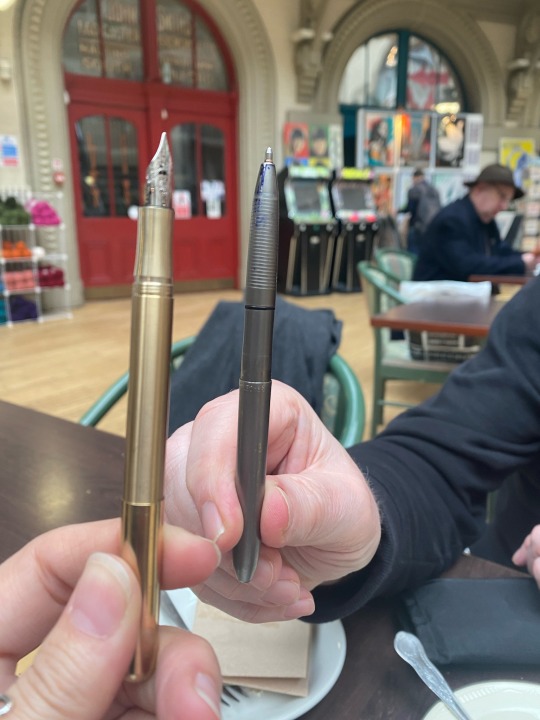

Hanging with Stephen Gallagher
Stephen Gallagher has written novels (LOVE Kingdom of Bones, Chimera, Rain) and television scripts (for Doctor Who — for Rosemary & Thyme, Eleventh Hour, BBC series Murder Rooms, etc.) I’ve known Steve for ages, and in addition to being a brilliant writer, he’s an extremely generous person with a keen wit and wonderful sense of humor. He also makes a good guide round Leeds, where we spent today. Tried to stop at the Book Barge (going to pick up a book by @neil-gaiman to pose with) but it was closed. Sorry Neil! Also went to the art gallery … and discovered we have similar taste in pens.
278 notes
·
View notes
Text

Thoughts about Ascended Astarion! (This is a long one, and I'm not trying to change anyones opinion, just highlighting the fact that the player is in complete control of the situation at all times. This game is about choices.) First off, I don't usually prefer to ascend him. But I love all versions of Astarion. His character is so well written and all of his arcs deserve praise and attention no matter what your personal opinion of them are. The devs did an incredible job. If any parts of his arc (ascended or spawn) make you uncomfortable, then romancing him isn't for you. If the dynamic between AA and your character makes you feel scared or upset, don't ascend him. That dynamic is supposed to be 100% consentual. He's a tough nut to crack and his story can be very triggering. I myself broke down a few times hearing him talk about what he went through. There are other companions with lovely character development that you can choose. When people go "ugh he's ruined I didn't want this" My dear, with all due respect. This is the dark fantasy romance option. Emphasis on the fantasy. You didn’t get his approval by being nice. It's not like he's the only option. You chose to romance the vampire. The game warns you of what exactly you're about to do multiple times. You willingly help him murder thousands of people for freedom. A vampire who was a literal slave for longer than he was even alive for just got a MASSIVE amount of power. Were you expecting he was gonna just be a good guy now? He has had NOTHING for so long. His entire life trajectory changed within moments. He’s still figuring himself out. You as the player are still completely in charge. He owes everything to you and he knows that. You can walk away at literally any point. He asks you to kneel and obey to establish trust and a dynamic. To confirm this is what you want. YOU CAN SAY NO. Then, he gets right down on the floor with you. He's either gentle or rough based on your choice. If you don't like the vibe just break up with him at that point like he literally lets you do. Or, even just reload the save. But just remember. "That's what you want, isn't it?". When Astarion ascends, Neil says it best. His mask is off and he's allowed to be at his most terrible with no fear. He doesn't have to perform or be aloof as a distraction from the pain anymore. He was never good aligned. But now, he has the power and ability to give himself and his favourite person the life he thinks they wanted. Otherwise why would you ascend him? His love language becomes acts of service and gifts. He ADORES tav to almost obsession. He's always doting on them and calling them his. The ritual only amplifies that. "but what about what he says if you convince him not to go through with it?"
He’s not lying. He knows tav saved him from himself. It is technically the “good” ending. But that’s not what matters here. The ascension is for characters who are not good aligned. It is for characters that are just as much of a power hungry monster as ascended Astarion is. They want to be a monarch that rules the world over. It’s a role playing thing. Is it wrong? That’s for you to decide for yourself. Not others.
"but what about karlach? He's a massive jackass to her when he ascends" ...Yes. He's not a good guy. Karlach is basically the goodest character in the game. It won't work. And if you do break up with him, he lashes out and says some extremely hurtful things. Because you just broke his heart. It's a perfectly normal response from someone being completely blindsided. He thought you wanted this. You said you wanted this. After everything you both did you get here, he feels betrayed. Not even to mention ascended Astarion does not make you just a regular spawn. You quite literally become his vampire spouse. He thanks you for putting your trust in him. Then eventually you become a true vampire with time. He wants to make sure tav doesn't go insane after being turned. If you wanna learn more about vampire spouses in DnD I highly reccomend doing some google searches. It's fascinating. Is ascending him the right thing to do? No, but it's not "wrong". The game doesn't work that way. Is keeping him a spawn the right thing to do? Maybe, if your character thinks it is. Either route has their sets of pros and cons. It's up to you which ones you think work for your playthrough.
I almost always convince him not to go through with the ritual. But ascended Astarion + durge is a power couple and the vibes are immaculate for evil runs. Just have fun with the game! The devs made all these character arcs for you to explore! Thanks for reading <3
#baldurs gate#baldur's gate 3#bg3#astarion#bg3 astarion#astarion baldurs gate#ascended astarion#spawn astarion#vampire spawn#dark consort#dark romance#astarion analysis#ascended astarion analysis#let people enjoy things
233 notes
·
View notes
Text
Good Omens Season 2: Some Thoughts (and also Screaming)
First, /screams
Second, obligatory disclaimer that this meta contains MAJOR SPOILERS for all six episodes. If you somehow have managed to remain virginally unspoiled, look away now, scroll past, or add "good omens s2" and "good omens spoilers" to your block list, as those are the tags I have been using for all posts and reblogs.
Third, /screams more
Okay okay okay. Deep breaths.
Anyway, so, uh, how about all that, huh? First, the good thing about the tone of the season overall was that it felt considerably darker and more adult, in a good way. We didn't have the precocious kiddies, the kitsch and literally-comphet Anathema and Newt, the so-clever narration, etc. All that was gone, which makes sense when you consider that a) the end of last season saw them reboot into an entirely new universe, and b) the fact that God has gone silent is, in fact, a major plot point for the season. We don't have Her slyly telling us the story, or indeed anything, and everyone is left to make their own judgments and take their own actions. Which, obviously, gets them into a lot of trouble, especially when Metatron (the Voice of God, aka someone acting in the belief that they're speaking for God and therefore doing terrible harm) swoops in with the ultimate buzzkill at the end of episode 6. But we'll get to that.
The downside was that the main, present-day plot (hiding Gabriel in the bookshop and trying to get Nina and Maggie to fall in love) was fairly thin, felt stretched out and at times weirdly paced, and otherwise existed mostly to get us to That Ending and the setup for season 3. But the ending was so damn good (if obviously, very painful) that I can't be TOO mad, not least because we spent six episodes with them just making absolutely no pretense about the whole thing being as incredibly homosexual as possible. I'll be honest: I did not think they were going to actually, explicitly go there. Neil Gaiman has been so consistent about "your interpretations are valid and you're welcome to read it however you want, but the only canon is what's on screen," which I think is frankly a good thing (not least since the Neil GAYman Cinematic Universe is consistently very, very good to us queers), that I just... didn't quite think they'd pull the trigger. Sir Terry is dead and can't have active input, this is based on a book published 30 years ago, maybe they didn't want to make it LIKE THAT... etc. I certainly hoped, but I didn't really think they would.
Uh. Well.
As I said in my various semi-coherent liveblog posts, I honestly don't think there was a single straight person in the entire season, among both major and background characters. Aziraphale/Crowley and Maggie/Nina are the obvious paralleling couples, but Beelzebub (using "they" pronouns and addressed as "Lord" despite presenting as femme/femme-adjacent) is clearly nonbinary and therefore also queer, and the countless gay/queer side characters were just /chefs kiss. From Job's son making a sassy pass at Aziraphale, to the random Scottish goon with Grindr on his phone (which he then gives to Aziraphale, because what is subtlety), to the interracial couple with the trans spouse at the Pride and Prejudice ball, there was just a lot of casual, unremarked, non-story-critical queer representation visible at every turn. It's like the NGCU saw the bigots wailing about Sandman season 1 being extremely gay and went CHALLENGE ACCEPTED, LET'S MAKE GOOD OMENS 2 EVEN MORE GAY.
God bless.
Obviously, Jon Hamm as Amnesia!Gabriel stole the show (he was SO fucking funny) and it was also incredibly fun to watch Miranda Richardson repurposed as a scheming demon. Nina Sosanya also reappeared as Nina the coffee shop owner, which leads us into the Maggie-and-Nina subplot. They're obviously, wildly, incredibly clearly an analogue for Aziraphale and Crowley themselves, but they're also each, crucially, a mix of both. On the surface, Maggie is Aziraphale: the plump, blonde, earnest, sweet-natured one owning a slightly dated book music shop and somewhat clueless about emotional nuances, while Nina is (also on the surface) Crowley, the hard-edged dark loner who doesn't want to open herself up to people or be spotted caring. But emotionally, Maggie is Crowley: the one openly pining, clearly besotted, only wanting to hang around their crush and do whatever they can to make themselves useful, while Nina is Aziraphale. Interested but reticent, attracted but conflicted, trapped in an abusive relationship with a demanding offscreen "lover" (Lindsay/Heaven) who tries to constantly control and shame them without ever offering much, if anything in return. By the end, they bring themselves around to what Maggie/Crowley are offering, but by then, well. We've got a lot more problems on our hands.
As I also said in my earlier posts, this entire thing has always been a metaphor for religion, queerness, and what religion -- especially abusive, fundamentalist, organized religion -- does to queer people, but they really cranked the FUCK out of that metaphor this season. Aziraphale is guilt-tripped, controlled, and shamed for his attraction to Crowley at every turn. He is torn between his imagined duty to Heaven, in all its ignorant, uncaring, bureaucratic, gratuitously cruel system that he still insists on seeing the best in because he can't bear the alternative, and the chaotic and sometimes grey but genuinely more good morality that Crowley offers him. (Can I just say, we were explicitly shown that the two of them together doing "just a little miracle" are more powerful than Heaven AND Hell combined.) And at the end, he's told that the only way he can be with Crowley -- what Metatron explicitly blackmails him with -- is if they both go back to heaven, submit themselves to the cruel system again and give up everything that has made them who they are: their home in London, their human friends, their reliance on each other, their independence, their own ways of doing things. You can be queer in this (religious) framework, but only the limited, watered-down, controlled, controllable, constantly-under-supervision kind of queer, which relies on both you and your lover "converting" back to the true faith. And if you don't cooperate, they will literally kidnap you, lie to you, manipulate you, take you from your soulmate, and force you right back into doing the one thing (destroying the world) that you never, ever wanted to do in the first place, because in their minds, that is still better than this. It's for your own good.
Ouch.
And the thing is: that's why the ending a) hits so hard and b) is so fucking painful, because of course Aziraphale agrees. He has no conception of being able to defy Heaven on his own; he has always, always needed Crowley for that. In the flashbacks, when Aziraphale is faced with an order from Heaven that he desperately does not want to carry out (such as letting all Job's children get killed), he still relies completely on Crowley to "outsmart the rules" and find a better way. Crowley is A Crafty Demon; that's what he does, and so Aziraphale rationalizes it to himself that therefore that must be fine. Even in season 1, when he really didn't want the Apocalypse to happen but initially thought it was his duty as a good Heaven footsoldier, he relied on Crowley to talk him out of it and allow him to do what he really wants instead. That's their whole dynamic in a nutshell, as exemplified in that scene in episode 2, where Crowley tempts Aziraphale with the "pleasures of the flesh" while sprawled on his back in Ravish Me mode like the giant walking gay disaster that he is. (Sorry, buddy. That beard. Can't do it.) Everything that Aziraphale's existence is, that makes him who he is, that he loves and cherishes the most (in this case, food and wine) comes from Crowley. Everything else is just background noise.
Throughout the season, what we see is Aziraphale increasingly coming around to the fantasy of being with Crowley. He's coy and flirty; he talks about "our car" and expects Crowley will let him (which he does); he wants to have a Jane Austen ball and for them to dance together (oh my heart); he even thinks, at the crucial moment, that the best way for them to be together is to go back to heaven just like they were in the beginning, once more perfect angels, as if those entire six thousand years of struggle and grief and pining and separation and falling didn't happen. And Crowley -- poor, poor, brave, devoted, heartbroken Crowley -- has just heard for the first time in said six thousand years that actually telling the person you love how you feel is an option. Maggie and Nina tell them point-blank that their whole stupid plan failed because people aren't chess pieces who can be moved and automatically achieve the desired result. And of course this gobsmacks the dearest and dumbest Ineffable Husbands, because they can't conceive of anything else. People are chess pieces in the Great War of Heaven and Hell; Aziraphale and Crowley themselves are chess pieces who have been desperately trying to get out of being moved by external forces, but that doesn't change the fact that that's what they are. They don't have volition or agency aside from that which they can sneak for themselves in brief and stolen moments. That's it.
Until, well. It's not it. They discover that this whole would-be war is actually an elaborate ruse to cover up another angel-demon romance, that of Gabriel and Beelzebub. (I'll be honest, I'm 99% sure they did this storyline because they saw the fans crackshipping them, but I appreciate a fictional narrative that values and incorporates its fans' input, rather than trying to constantly "trick" or "outsmart" them or "do what they don't expect.") And Gabriel and Beelzebub get to be together, but only by leaving their world forever. They have to desert their homes, their structures, even their own identities, and never return. And Crowley and Aziraphale are so rooted in their "precious, perfect, fragile" life in their little corner of Soho, with their bookshop and their Bentley and their dining at the Ritz (which they didn't get to do in the end because METATRON /shakes fist), that that just doesn't work. Neither of them can conceive of doing that. So Aziraphale thinks "go back to heaven and try to make the terrible system do some good and take what we can in terms of being together" and Crowley just... pours out his heart. He's ready to fucking propose. He barely stops himself from saying something to the effect of "I want to spend eternity with you." He begs, he pleads with Aziraphale to go away not in the literal sense, but the emotional/metaphysical: to finally break this toxic dependence on Heaven and tell them once and for all where to stick it. And because he is desperate to make Aziraphale understand, he finally throws all caution to the winds and recklessly, desperately, adoringly kisses him, the one thing he's wanted to do for ages and...
Gets. Shot. Down.
Ugghhhhh. I'm suffering all over again. Aziraphale wants him, hungers for it, for them, and yet he's been so abused and so conditioned by Heaven (he's still blithely repeating to Crowley's face that "Hell are the bad guys!") that he just cannot accept that kind of desperate, blind, limitless, lawless affection. He even forgives Crowley for this "transgression," just to really twist the knife, and Crowley just can't take it, can't face up to how terribly this has all gone up in flames, after he went to heaven trying to find the answer for Gabriel's situation. Gabriel, who he fucking hates. Gabriel, who tried to kill the angelic being he loves (and for which Crowley has transparently never forgiven him). And yet at one pouty puppy-eyed look from Aziraphale and a warning that whoever is harboring Gabriel might be in danger, Crowley leaps headlong into the Bentley again and rushes to the rescue while "Good Old Fashioned Lover Boy" is blaring. He stoutly protects Gabriel; he does a miracle to disguise him; he lets him have hot chocolate and stay in the bookshop; he guards him from the literal demonic horde outside. All because of Aziraphale. That's it. And then, it still doesn't work. Not only that, Gabriel's absence and decision to forego Armageddon gives Heaven the one tool they finally need to take Aziraphale away from him.
I repeat: Ugghhhhhhhh.
(In a good way. Ngl, I love this angst. This is the kind of angst my brain Thrives on, the Thematic Parallel Romantic Character Arc kind. Nom nom nom. But also: AGONY.)
I also need to talk about Aziraphale driving the Bentley, aside from the obvious metaphor of him being in Crowley's home while Crowley is in his. Last season, we had the "you go too fast for me, Crowley" scene with them sitting in said Bentley, which was Aziraphale saying he's not ready for a relationship. In this season, as noted above, we see Aziraphale increasingly embracing the potential fantasy of being with Crowley. But here's the catch: when he's in the Bentley this time, driving it, setting the pace, acclimating to the idea, he's driving his own idea of what the Bentley/his relationship with Crowley is. It's not the real thing. He plays classical music; he supplies himself sweets; he turns it yellow; he drives too slow. Crowley calls him in another old-married-couple snitfit to complain that Aziraphale's messed it up, but what Aziraphale has actually messed up (or will, by the end of the season) is far more consequential than just a car. He's changed the entire shape of their relationship to the one he thinks can make it work, and it just doesn't. It has to be them -- "we could have been... Us" -- or it's not even close to the truth. It's not worth their time.
I repeat: Ouch.
Speaking of the writers validating fan theories, I know we all picked up and screamed about on Crowley's idea of Peak Romance Guaranteed To Fall In Love being sheltering from rain and gazing into each other's eyes, which confirms that that poor bastard was indeed ass-over-teakettle gone as soon as he met Aziraphale (again) in Eden. I also need to talk about the 1941 redux, because wow. This time, the danger comes from Hell, which we see being its usual self: gleefully, pointlessly cruel, pettily backbiting, dirty, sniping, tedious, endless, determined to mindlessly destroy because They're The Bad Guys and they like it. So they blackmail, spy on, miracle-block, illicitly photograph, and try to prove that Aziraphale and Crowley are secretly a couple, right after Aziraphale himself has just had the Light From Heaven realization that he's in love (which we all also picked up on in s1). They're forcibly outing them (to speak of more Religious Queer Trauma) in order to break them up/get them into trouble with their authorities/families. Aziraphale and Crowley manage to escape it mostly by dumb luck, but Crowley having an altogether freakout, hands shaking, barely able to actually point the gun at Aziraphale even in the knowledge that it's supposed to be fake, is just... wow. He can't even fathom the idea of ever trying to destroy him in earnest, especially when he knows on some level that Aziraphale also finally just realized his own feelings. So I just need to --
/screams
Anyway, Aziraphale's entire arc this season is doing what he thinks is the right thing and then inadvertently causing harm and damage as a result. In the Edinburgh flashbacks (live slug reaction of me: SEAN BIGGERSTAFF???!!) he tries to stop Elspeth from stealing bodies and gets Morag killed and Crowley drinking the laudanum to save him (though that part with David Tennant just riffing left and right, using his natural Scottish accent, and being Tiny Crowley/Huge Crowley was hilarious). He invites his neighbors to a Pride and Prejudice ball and makes them all the target for demonic attack. And of course the Job episode: Aziraphale, horrified at Heaven's callous cruelty, desperate not to get Job's children killed, willing to go along with Crowley's tricks to save them somehow, tempted by Crowley to do the fucknasty with their angel bits eat some food and decide that he likes it. As mentioned, the whole thing about God being silent this season is a major thematic choice. The only time we see/hear God is Her communing with Job from afar. Aziraphale enviously imagines the answers he must be getting (he's not, he's baffled and perplexed), while Crowley longs beyond words to even have the opportunity to ask the question: why? Why do this? Why is this your plan?
And of course, this absence culminates in the Metatron, the Voice of God, the person arrogantly claiming that they're speaking for God and know exactly what Heaven wants, being able to seize Aziraphale by the short hairs and absolutely fuck him over. Gabriel is gone/decommissioned/eloping with Beelzebub, so Heaven needs a Supreme Leader (God apparently is no longer a factor in the equation). And what this Supreme Leader needs to do is finally unleash the Apocalypse that Gabriel decided to pass on (the Second Coming). Aziraphale needs to be punished, taken away from Crowley's influence/love, and put back under Heaven's explicit control, so Metatron spots a great opportunity to do all three at once. It's not an accident that the exact tool he uses to get Aziraphale to agree is "now you can actually be with Crowley!" Aziraphale and Crowley have been trying so hard to hide out from their respective Head Offices, but now all at once, there's this seemingly miraculous opportunity for them not to have to do that anymore! They can be together! They can be sanctioned by Heaven! They can give up all this hiding and sneaking around and lying! Isn't that better?
... As long as, of course, they give up absolutely everything that makes them who they are. No big deal. Minor catch. Probably nothing.
Metatron doesn't let Aziraphale have time to escape, or think it over, or reflect, or anything. He pressures Aziraphale to come with him immediately, or be once more subject to Heaven's implicit wrath/destruction/judgment. Believe me, Aziraphale already KNOWS he's made a huge mistake, as soon as he hears what Metatron really wants: bringing him back to unleash the Apocalypse that Aziraphale and Crowley have given up literally everything to prevent. He doesn't need time to reflect. By the time my man is in that elevator, he's well aware of what a catastrophic misjudgment he's made, and yet --
Aziraphale needs this. He has, as noted, literally always relied on Crowley outsmarting Heaven's cruel orders in order to prevent himself from having to do them. He's relied on Crowley rescuing him ("rescuing me makes him so happy," WELL BUB, IT'S BECAUSE YOU ALWAYS NEED IT). He admits to Crowley's face that "I need you!" He hates Heaven's sadistic meanness, but he has absolutely no framework, in and of himself, to defy it. When the rubber hits the road, he will crumple and try to go along with it, and now he's been put in a position where he's going to have to stand up, defy Heaven, and make the break once and for all BY HIMSELF. He doesn't have Crowley around to do it for him, he has no support, he is going to arrive in Heaven and be shuttled straight off to the Apocalypse 2.0 War Room. The only way he gets out of this is if he actively stands up, if he chooses himself and Crowley and their life, and he has to.
The thing is:
Aziraphale has lived his entire eternal existence Looking Up. Up is the direction of Goodness and Heaven. Up is where Angels go. Up is where Aziraphale comes from and where Demons and Hell are not. But now he's going Up, in a position to take over the whole shebang, and it's the last thing he wants.
So he's going to have to come back Down.
He's going to have to Fall. He's going to have to get back Below at all costs. He's going to have to finally, once and for all, understand what led Crowley to make the choice to leave Heaven and never come back. It's only then that they can possibly be together on any kind of conscious, equal, deliberate footing, claim their own agency, reject Heaven AND Hell, and try to really earn that South Downs cottage and that happy-ever-after, and it's gonna hurt so good.
Now if you will excuse me, /screams
#good omens#good omens meta#good omens s2#good omens spoilers#ineffable husbands#look this probably could have been twice as long#but i had to stop somewhere#I JUST HAVE A LOT OF FEELINGS
903 notes
·
View notes
Text
Andrew and Neil are mirrors when it comes to Crime and Exy
Andrew's gifted at Exy and is a rookie with potential at Crime
Neil's gifted at Crime and is a rookie with potential at Exy
And as I've said in another post before, let's look at Colombia as an example
It was a weird plan to start with, first of all cracker dust isn't truth serum it's just something to make Neil feel buzzed.
So maybe Andrew's plan is to interrogate Neil while high so it's easier to catch him in a lie, which is a decent plan except he fumbles the plan so hard when he leaves Neil alone with Aaron and Nicky.
According to the EC Andrew got so hot and bothered by Neils new outfit that he needed to blow off steam with Roland for a minute. But he really should have been focused cause Aaron and Nicky have dusted and drank, they are both more high and intoxicated than even Neil is, not the best people to put in charge at that moment and the instructions Andrew gives them are not clear.
Aaron clearly doesn't care about this plan. Nickys behavior was extremely reprehensible for sure. But I do wonder, was Nicky expected to give Neil more dust, and if so, how? Either Nicky acted on his own with giving Neil more or Andrew expected him to dose Neil with more drugs but it's totally up to Nicky how that happens (and Nickys choice of mouth to mouth was NOT OK, the EC confirms that Andrew never knew that Nicky kissed Neil).
Like Andrew, my dude, so far, this is poor delegation and supervision. Aaron wasn't gonna let this plan ruin his weekend 🤣
Doing this at a crowded club even one where he knows the staff might have seemed like a good idea in Andrew's mind but clearly that belief betrayed him too cause Neil was able to bribe a busboy to knock him out and Neil could have asked one of the patrons to do it if the busboy hadn't. And it's not as if the situation couldn't have taken a worse turn if any of the patrons turned out to be dangerous and happy to take advantage of a drugged, unsupervised teenager. Andrew did not have full control of the territory here. there were too many unpredictable variables.
Then, instead of being there in the morning when Neil wakes up and is groggy and prime for another attempt at interrogation, ANDREW LEAVES HIM WITH AARON AND NICKY AGAIN. And even with both of them now cold sober Nickys feeling remorseful, Aaron is still largely indifferent, and Neil clocks this and bails, knowing that they won't bother checking in on him anytime soon and are as per usual fine letting him out of their sight.
This gives Neil a NICE LONG WINDOW to come up with a plausible lie.
Meanwhile, Andrew is now on everyone's shit list and (assuming Neil was a Moriyama mole) made Neil a sweet bullied baby boy the whole team wants to protect from the mean boys. IF Neil was a mole, Andrew could not have made things easier for him cause any suspicion will be deemed Andrew being a bully and Wymack made it very clear that he is done with anymore of this, he didn't even want to leave Andrew alone with Neil.
My question is, why didn't Andrew use the binder? Remember when Neil leaves his room while Matt was out picking up the girls from the airport and while Neil went to get the safe, Andrew broke in to his room and looked through his stuff and found the binder. Then he put it back, folded Neil's clothes in a way that would alert him to someone riflling through his things. Nora answered a fan question on tumblr that the way Andrew folded the tags was to let himself be caught on purpose and gauge how paranoid Neil really was. To what end, I dont know.
Why give Neil that advantage? He could have questioned him without letting Neil know he went through his stuff. So Neil could be blindsided and be less likely to come up with a good lie?
Also
Why didn't he take the binder?
First he could use it to ensure Neil's good behavior, he could threaten to burn it if Neil doesn't talk and given that Neil needed time to come up with his cover story, this would have forced him to be more truthful as he would have had to lie on the spot which is easier to catch.
Given the illegal shit in that binder it's not like Neil could have told anyone that Andrew took it or go to any authorities about it.
He can't run away without it either. He would have been completely at Andrew's mercy.
And if Andrew needed to justify his actions, he only needed to show the team and Wymack Neil's stalker journal to make them all suspicious of Neil and get them on side with his actions.
But he didn't do that.
And I'd like to think that Neil lectured Andrew about this and about him being too trusting of other people when pulling crimes, picking more reliable allies and locations, not losing track of the goal cause you're horny, and being more ruthless.
The same way Andrew gave Neil that amazing insight about the way he plays Exy.
Just sharing knowledge and expertise with each other.
#aftg#all for the game#neil josten#the sunshine court#tsc#the king's men#tkm#the raven king#trk#the foxhole court#tfc#andrew minyard#the foxes#aaron minyard#nicky hemmick#david wymack#i do love all of the characters in aftg even when they are derpy#andriel
85 notes
·
View notes
Text
It's time for the fandom to start Looking Where the Furniture Isn't
For a bit of background, one of my irl professional responsibilities is to identify and avoid making undue assumptions. There are a LOT of things that we humans assume. We assume that terminology means the same to other people as it does to us. We assume everyone has the same context of a situation we do. We assume that we aren't missing any information.
We operate on the information we have.
There was an ask before season 2 aired asking whether many of the plot points had been revealed by the clips (which almost all took place during the first half of the first episode). Neil's response was something like "oh you sweet summer children you know nothing yet." And boy was he right.
Neil Gaiman is a master of controlling assumptions. Just look at his Tumblr askbox replies.
Here's a few s2 examples of assumptions we all made (as I'm starting a rewatch):
Why did Crowley do the (very fun and distracting) apology dance? You might say it was because he walked out on Jim, but he never specified, did he? And Aziraphale was surprised that he proposed they would hide him "together"
How did Shax get a rumor about something going down in the Up (presumably) before Gabriel even went downstairs?
Did Jim need to bring Aziraphale something other than the box? He never actually specifies; Aziraphale just assumes it's the box.
Why did Aziraphale assume Maggie could feel [Michael, Uriel, Saraquael] arriving?
Why does Aziraphale say Heaven would notice even a small miracle? Crowley is seen doing a miracle before their large miracle (traffic light), and later Aziraphale makes the guy leave the table at the pub
To go deeper:
Are we assuming that characters are telling the truth? Example: "Miracles don't work like that," "[Extreme sanctions] was just something we said to frighten the cherubs" etc.
Are we assuming that nothing of note happened between apocalypse v1 and s2? (ex. the claims that Crowley didn't tell Aziraphale about the trial in heaven despite him referencing it in s2s1) What if we the audience are just jumping in near the end of this story?
Are these assumptions correct? Or are we just working with the information that we have?
Now that I'm looking for it, there's also SO many corrections of assumptions (usually for the sake of a joke, but still) (these are just the ones that happen while I type them out while watching e2):
"Can I be a blue one?" "You haven't annoyed me yet" "But can I be?"
"You recognized [Michael, Uriel, Saraquael] those people who were in the shop just now?" "Of course, they were in the shop, just now!"
"oh my god!" "blasphemy, angel, that's not like you", "no, oh, my god"
Many of the themes were about hiding things in plain sight: the kids (and kids), Jim, "aim for my mouth but shoot past my ear." Clue (1985) was heavily referenced in the lead-up. The whole point of that film was looking at what was going on elsewhere. Looking where the furniture isn't, you might say.
The more I watch s2, the less certain I am that any of it makes sense on its own.
I'm currently combing through it to see if there are any discrepancies with where people are (easiest example is when Crowley just disappears from the bookshop while they're reviewing the Job story). It'll be a lot of data and might not lead anywhere, but I'll definitely share once I finish looking into it.
I will also honestly admit that these things are all circumstantial, and I could be going insane. But they just keep cropping up all over the place. I've got a lot of time before S3 comes up and I intend to investigate the furniture. And try to not make assumptions.
#good omens#gos2#good omens spoilers#good omens meta#good omens theory#aziraphale#crowley#s2 wrecked me#it's driving me insane#I'll be completely transparent on that front#looking where the furniture isn't
470 notes
·
View notes
Text
The HUGE analysis - This season starts and ends with a discussion, doesn't it?
Ok, my loves. This was one of the really long metas I've been working with, and probably the one that has taken me the longest (because it depended a lot on rewatching the season time and again).
I couldn't help to notice that the fist interaction Aziraphale and Crowley have in season 2 is a fight, really. Yeah, we have the beautiful “in the beginning” sequence, with both of them being angels and happy and all the such (oh, how lovely, Neil Gaiman planting the seeds of why it will matter to us that Aziraphale will not be fighting the idea of inviting Crowley to Heaven, because he remembers that happy, careless guy). But after the intro, we see them having a big disagreement… And we end the season in the biggest disagreement they have had, probably, in 6,000 years.
I love over-analyzing and dissecting narratives and characters, and more so if I can use only what we’ve been shown in the screen. Therefore, I believe that the first fight of the season tells us a lot of the things we will need to know to understand the final fight of the season between them. Let’s take a look, shall we?
The first fight is motivated by having an amnesiac Gabriel in the bookshop.
They see the same circumstance: Gabriel in the bookshop means trouble with Heaven. He is also an individual risk, because he has menaced Aziraphale directly (well, Crowley under the visage of Aziraphale).
It affects each of them differently: even when they both panic, Aziraphale feels compelled to be kind to Gabriel (gives him a blanket and hot cocoa) while Crowley has a full-on panic induced reaction and gets defensive.
They propose opposite solutions: Azi wants to do the Good thing, taking the “higher road” (help Gabriel), while Crowley wants to do His Own thing: “Protect the precious, peaceful, fragile existence I have carved for myself”
At that moment, Aziraphale corrects him and marks a “we”, which is very interesting. But immediately after that, Aziraphale gets all "my way or the highway".
Crowley asks for clarification, with a well-leveled tone of voice: “Is this how it is going to go?”
Azi clarifies "no, I want you to help me!" But then he does the passive-aggressive thing: "if you won't, you won't". (oh, Aziraphale, how you triggered me here, my dear chap. I was angry at the character the first 6 times I saw this)
Therefore, Crowley is out. He marks a clear limit: “I won't. You are on your own”, and then storms out. No Eccles cakes would help him: he needs a breather and counting to 10. That doesn't help either.
Crowley only comes back after gaining an extra perspective: the "extreme sanctions" talk with Beelzebub.
When he comes back, Aziraphale will stand his ground: he feels he deserves an apology, which is delivered via a “I was wrong, you were right” literal admission (even when he probably wasn't "right", but that's their way... And they've been doing it since 1650, or so they say). Then they are able to work together again.
Now, let’s see how this dynamic plays out in their last discussion of the season:
They come from different sides of the same experience: Crowley went to Heaven to investigate and learned about the plans to continue with the end of the world, while Aziraphale stayed defending the bookshop. Then Crowley saves the humans, while Aziraphale solved the Beelzebub + Gabriel affair.
They haven’t had time to talk, as they get interrupted by The Metatron. While he takes Aziraphale, Crowley receives a visit from Maggie and Nina.
Each one of them gained an extra different perspective: Azi, the Metatron proposal (and veiled menace); Crowley, the pep talk/scolding from the couple they were trying to get together.
This makes them develop different solutions:
Crowley wants to finally admit what Azi has been saying all the season: they are a "we" (Azi said so when Crowley talked about his “precious, peaceful, fragile existence”; he said it again when talking about “our car” and reinforced it with the bookshop)
Azi wants to take the "higher road": go to Heaven, reinstate Crowley as an angel, so they can still work together.
Crowley sees the “usual dynamic” of their disagreements coming: it will be Azi’s way (or the highway). That has happened before, in front of our eyes, and not only in this season: it happened also in season 1, but we have already attested that it is still happening, and it is even “worse” (Aziraphale being a little “petty” with the “if you do, it is fine, but if you won’t, you are on your own” in the Gabriel discussion).
Crowley gets indignant. He asks, tentatively, if he told him where to stick it… And then he reinforces his belief. We are better than that, YOU are better than that, you don’t need them, I don’t need them; then he makes the first mention of the offer of getting back to Hell (which he hadn’t shared with Aziraphale), and makes a new point: I said no, neither should you!
Aziraphale goes back to the “you are the bad guys!” thing. Heaven being the side of Truth, of Light, of Good… It is not the propaganda Crowley needed for this move.
Crowley then clarifies the fallacy in his logic: when Heaven ends life on Earth, it’ll be just as dead as if Hell ended it.
Aziraphale then sees the "undesirable result" coming: Crowley is not going to accept, not with that argument.
Crowley makes his plead grow in urgency: Tell me you said no.
Aziraphale’s pitch of voice goes high (usually used as a sign of distress): “If I’m in charge, I can make a difference.”
Crowley understands. This is his “my way or the highway” moment. That’s why he comes up with the courage to make his half-proposal-half admission.
Crowley never gets to state out loud the “I want us to be together in a formal way” part. His voice breaks before he does so. He mentions all of the reasons they have to stay together, which Aziraphale already knows: we have been together for a long time, we’ve been a group (“our own side” was the way he always said it before) and we’ve spent our existence pretending that we aren’t (Azi also knows that! He has been working hard into making Crowley notice it!)
You can see, when they shoot Aziraphale’s face, he squints a little during that moment: maybe questioning, a little disbelief? As usual with Michael Sheen, it is a blink it and you’ll miss it moment.
After the grunt, Crowley proposes his alternative solution: going off together, using Beelzebub & Gabriel as an example that they could.
Therefore, what Aziraphale has just listened is what he already knew: yes, they are a “we”. Crowley wants to run away (he had proposed it twice during the Armageddidn’t, another pattern they have already established).
The next step is the usual way for Aziraphale: he reinforces his proposal: come with me, to Heaven. Ill’ run it, you can be my second in command. This idea has rubbed me wrong since the first time I watched this scene. Why remark the hierarchy? (not to say that I’m in Crowley’s side in here, but… It was weird and uncomfortable to think of them in a vertical power structure; they have always been equals).
Then, he goes back to making a difference, only it is “we” this time. Crowley is noticing he won’t back down… But Aziraphale usually doesn’t.
“You can’t leave this bookshop” works as a representation, a figure of speech. “This Bookshop” is “This life we have been building”, and they both understand it as such.
“Oh, Crowley… Nothing lasts forever…” For Aziraphale, it means he can leave this for something greater. For Crowley, it means… Actually, the same. But without him. Because he knows the “my way or the highway” side of Aziraphale, and none of them will budge. Aaaaand… that’s Crowley heart breaking. The rest of the scene happens with Crowley in “breakup mode”.
Aziraphale is used to “the discussion dance”. He Insists, “Crowley! Come back, to Heaven, work with me! We can be together, Angels! Doing good!”. He promises all he can: “come back, work with me, we can be together”, which have always been Crowley’s triggers to change his mind. However, the problem lies within the “angels doing good”. That’s the part that Aziraphale would need to let go before getting back to Crowley.
And then, he breaks down: “I need you!!” That has always worked! Aziraphale knows that Crowley loves being needed, he won’t leave his angel when in need, right?
And then, he gets angry. And he questions if Crowley has understood what he is offering, which transforms in an “I don’t think your exactly and my exactly are the same exactly” all over again.
Crowley is already brokenhearted, so he answers truthfully, as far as he knows. He understands how terrible the offer of going back to heaven is for both of them, and is not aware of the veiled threat in Metatron’s offer. He knows that going back to Heaven is a non-negotiable boundary, and Aziraphale is absolutely determined to cross it.
Aziraphale, then, does his passive-aggressive shit again: “I guess there is nothing more to say”. My guy, my love, you need to become better at negotiating with your loved one.
This is where Crowley decides to show, don’t tell, the hurt: no nightingales. And then… The “You idiot. We could have been… us” (no, you couldn’t, it was always too late!!! First the pandemic, which I’ve decided to treat as canon, then Gabriel. They never stood a chance).
In this context, Crowley’s kiss is a desperate way to say good-bye to the person he cared most for the last 6,000 years; also an angry way to regain some semblance of control and affect Aziraphale; and a final way to get some “closure”. Is there desire? Is there love? Maybe. But they are lost in a cocktail of emotions that have been stated during the rest of the discussion.
The angry “I forgive you”, which is also a usual dynamic for Aziraphale when he is angry with Crowley, gets there too late for Crowley to react to. He has already “checked out”. That’s why the “don’t bother” feels almost like an afterthought and comes after a small sigh.
After watching this 16 times, I’m pretty confident that the first thing Aziraphale mouths is a “no…” and then… he sobs a little. Michael Sheen, you’re a beautiful actor. The rest of it is a masterclass in using microexpressions to convey a whirlwind of emotions in under 2 minutes.
Sooooo... Did I hurt my own emotions while writing this? Yes. Did I absolutely need to do so? Also yes. Even when I like doing intertextual readings (and that's why I like bringing some theology to some of my musings), reading what is in "the text" (in the scenes we have watched, in the dialogues we've been shown) gives me an enormous amount of pleasure, and I find a lot of comfort in believing that most of the things that I'll need to understand and enjoy a great piece of media are being given to me inside it. And I believe Good Omens is a great piece of media!!
I have no Shakespeare to offer you this time. Let me know what you think!!
#good omens 2#good omens meta#good omens spoilers#ineffable divorce#the final fifteen#narrative analysis#character analysis#good omens#anthony j crowley#aziraphale#If I was into Academia this should be counted as a journal referenced publication#Making my Comms Sci degree useful for something
470 notes
·
View notes